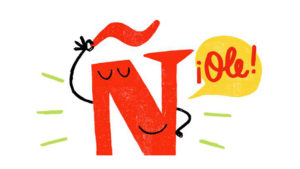 One of the singularities of the Spanish language is the use of the letter ñ. From the first moment we find this particularity in the name España o español. Where does this letter of exclusive use in the Spanish language come from?
One of the singularities of the Spanish language is the use of the letter ñ. From the first moment we find this particularity in the name España o español. Where does this letter of exclusive use in the Spanish language come from?
If we research the net, we can find its origin and specific sound (similar to -ny-for English speakers), according to Wikipedia:
“Historically, ñ arose as a ligature of nn; the tilde was shorthand for the second n, written over the first. This is a letter in the Spanish alphabet that is used for many words, for example, the Spanish word año (anno in Old Spanish) meaning “year” and derived from Latin ANNVS.
Already in medieval Latin palaeography, the sign that in Spanish came to be called virgulilla (meaning “little comma”) was used over a vowel to indicate a following nasal consonant (n or m) that had been omitted, as in tãtus for tantus or quã for quam. This usage was passed on to other languages using the Latin alphabet although it was subsequently dropped by most. Spanish retained it, however, in some specific cases, particularly to indicate the palatal nasal, the sound that is now spelt as ñ.
From spellings of anno abbreviated as ãno, as explained above, the tilde was thenceforth transferred to the n and kept as a useful expedient to indicate the new palatal nasal sound that Spanish had developed in that o. The sign was also adopted for the same palatal nasal in all other cases, even when it did not derive from an original nn, as in leña (from Latin ligna) or señor (from Latin senior).
The palatal nasal sound is roughly reminiscent of the English consonant cluster /nj/ canyon /ˈkænjən/. While this common description is enough to give a rough idea of the sound, it is not precise.
Although ñ is used by other languages whose spellings were influenced by Spanish, it has recently been chosen to represent the identity of the Spanish language.”
Finally and to summarize, we must always emphasize on the correct pronunciation of this letter, which represents a sound very different from the sound of the letter n and of course highlight the importance of writing the words that contain this sound correctly, with the small comma on top of the ñ.
Here are some of the most common words with ñ:
Año year
Niño little boy
Araña spider
Baño bathroom
Extraño strange
Mañana morning
Señor Sir
Montaña mountain
Sueño dream
Compañía company
Otoño autumn
And many more!